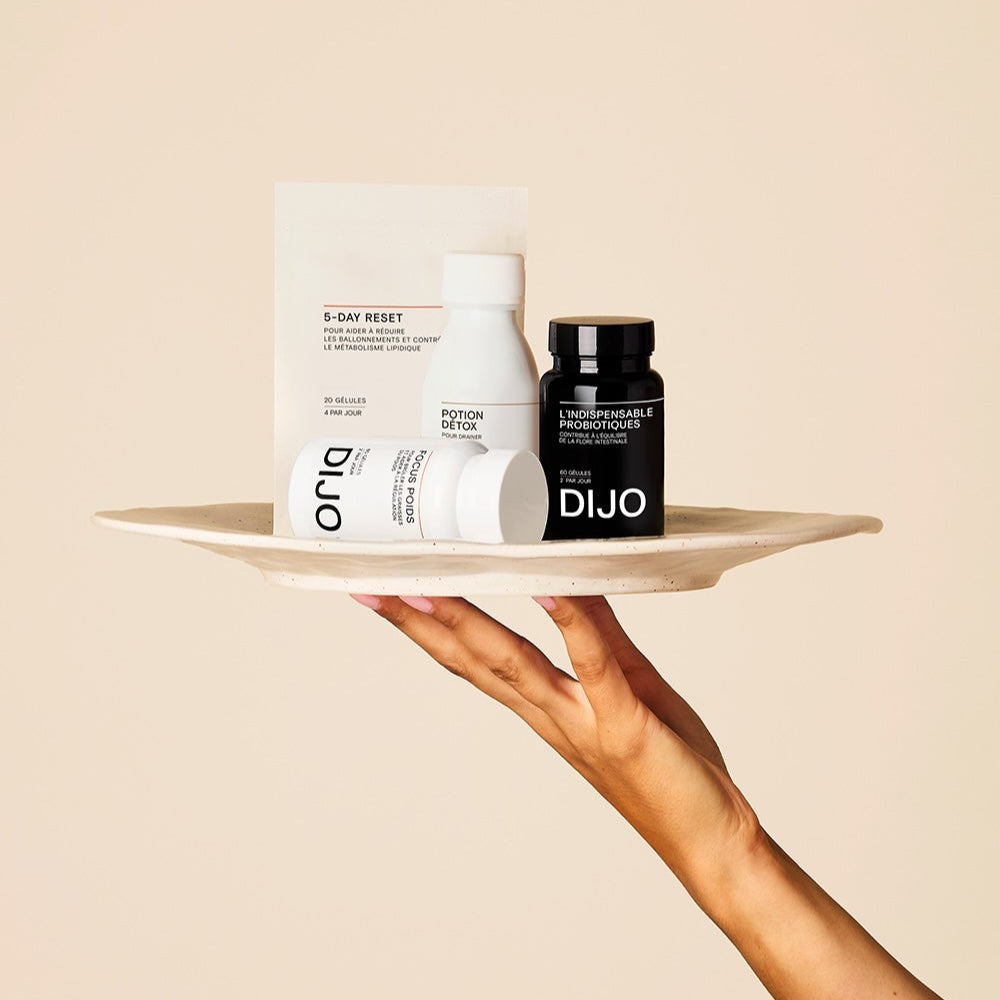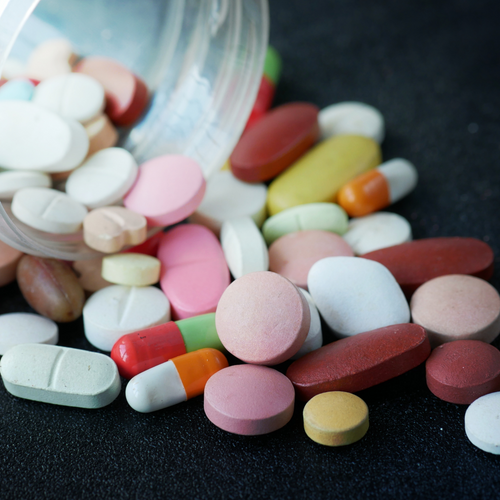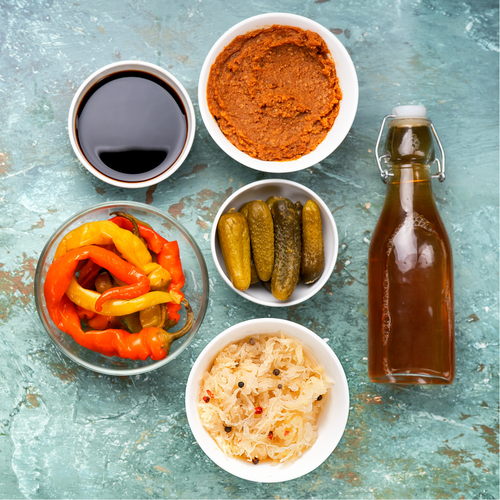What to remember :
The intestinal microbiota corresponds to all the microorganisms present mainly in the intestine and colon.
It regulates many essential functions of the body
It is responsible for the proper functioning of the digestive, immune, metabolic and cerebral systems.
A balanced lifestyle helps reduce the risks of dysbiosis or microbiota imbalance.
The intestinal microbiota is a group of microorganisms that primarily inhabit our intestines. It is the most densely populated microbiota in our body, with 10,000 to 100,000 billion microorganisms, including non-pathogenic bacteria, viruses, fungi, and parasites with numerous functions.
Development and evolution of the intestinal microbiota
Before birth, within the mother's womb, the baby has a sterile environment. No bacteria come into contact with it. It is at birth that it discovers this non-sterile environment and takes its shower of bacteria. The intestinal microbiota is gradually formed and thousands of microorganisms begin to populate its digestive system by depositing themselves on the intestinal wall .
The route through which the baby exits has a primary impact on its microbiota. Indeed, if the delivery takes place vaginally, the baby will be covered with bacteria from the mother's vaginal flora, which favorably immerses it in our world. On the other hand, if the delivery takes place by cesarean section, the baby is deprived of this protection. This is why more and more professionals are compensating for this by coating the baby with this flora.
Subsequently, breastfeeding, if established and possible, also provides good bacteria. At the age of 3, the microbiota reaches maturity, even if its evolution is constant throughout life. Indeed, it evolves according to lifestyle, hygiene, medication taken throughout life, diet, where we live, physical activity, mental health, but also the people we kiss. It is therefore unique and specific to each individual.
Roles and functions of the intestinal microbiota
The gut microbiota regulates virtually all of our health. It is involved in numerous digestive, metabolic, immune, and brain functions. We now know that these bacteria influence our weight, allergies, immune system, and even behavior!
Intestinal microbiota and digestive system
The gut microbiota thrives on the indigestible nutrients we provide. It also promotes nutrient assimilation. This helps ensure the digestive system functions properly. Indeed, our digestive system has 200 million neurons. It was long thought that it was the brain that "spoke" to the gut. We're beginning to understand that the gut speaks just as much to the brain.
Intestinal microbiota and the immune system
The intestinal microbiota constitutes 80% of our immune system . Indeed, our microbiota is in close communication with the immune system. It allows us to positively or negatively modulate the production of inflammatory and immune molecules.
Furthermore, due to its location, it acts as a protective barrier against the entry of pathogens into the body. It also acts on this system by producing molecules or active ingredients with a bactericidal effect.
Gut microbiota and inflammation
Compounds produced by the intestinal microbiota, such as short-chain fatty acids, have many benefits for the body, including modulating the production of immune cells and inflammatory compounds. This helps strengthen the intestinal wall and act as a real shield against attacks around the intestinal mucosa. Through their communication with the immune system, bacteria can cause or prevent inflammation . Remember that inflammation is essential in the event of infection because it is what allows the influx of immune cells to the affected area in order to destroy pathogenic organisms and repair damaged tissue.
How to promote a healthy gut microbiota
Maintaining your overall health for a good intestinal microbiota
Taking care of your health means, above all, regulating and supporting your gut microbiota. A balanced lifestyle is essential. Therefore, regulating your emotions, balancing your diet by providing sufficient nutrients, engaging in regular physical or sporting activity , and avoiding highly polluted environments are essential principles for a balanced microbiota.
Additionally, taking antibiotics or certain drug treatments can alter the diversity of this microbiota. This is why taking probiotic supplements can help and support this flora.
Diet to take care of your intestinal microbiota
Diet is the primary source of maintaining the well-being of our digestive system and microbiota. What we eat directly influences the richness and diversity of our intestinal microbiota. Our intestines love certain fibers called prebiotics . These fibers are complex carbohydrates that are not digested by the intestine and they feed our good bacteria, which multiply. This allows them to better fulfill their missions:
-
Vitamin production
-
Maintaining a healthy immune system
-
Boost metabolism functions to prevent weight gain
In addition to feeding good bacteria, fiber also activates all intestinal functions related to digestion and transit! Each species of bacteria preferentially digests one fiber over another, hence the importance of varying fiber sources. Foods rich in prebiotics are mainly plants (endives, asparagus, leeks, etc.) and fruits (bananas, apples, grapefruit, berries, grapes, etc.), but they are also found in whole grains, dried vegetables, and oilseeds.
Aside from foods rich in fiber, there are also foods rich in probiotics that will provide a small portion of beneficial bacteria for the intestinal microbiota.
Sources :
[1] INSERM, 2021, Intestinal microbiota (intestinal flora), consulted from https://www.inserm.fr/dossier/microbiote-intestinal-flore-intestinale/
[2] Chang, C.; Yuan, X.; Zhang, X.; Chen, X.; Li, K. Gastrointestinal Microbiome and Multiple Health Outcomes: Umbrella Review. Nutrients 2022, 14, 3726. https://doi.org/10.3390/nu14183726
[3] Hashem, NM; Gonzalez-Bulnes, A. The Use of Probiotics for Management and Improvement of Reproductive Eubiosis and Function. Nutrients 2022, 14, 902. https://doi.org/10.3390/nu14040902
[4] Bodke, H., & Jogdand, S. (2022). Role of Probiotics in Human Health. Cureus, 14(11), e31313.https://doi.org/10.7759/cureus.31313
[5] Al Bander, Z., Nitert, M.D., Mousa, A., & Naderpoor, N. (2020). The Gut Microbiota and Inflammation: An Overview. International journal of environmental research and public health, 17(20), 7618. https://doi.org/10.3390/ijerph17207618
















